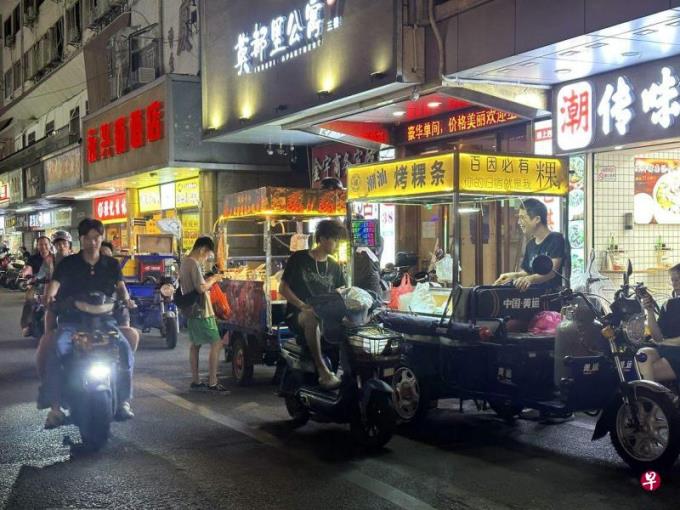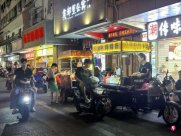
In order to boost consumption and increase the breath of urban fireworks, China has recently introduced regulations to regulate stalls in many places, and no longer banned roadside stalls.The scholars of the interviewees analyzed that the policy transformation reflects the "pain" facing the slowdown in China's economy after the epidemic, but it also means that urban management has tended to become more humane from "one -size -fits -all".
Shenzhen has recently canceled the regulations on prohibiting "stores, store supermen, stores on the windows outside the window" through the newly revised Shenzhen Special Economic Zone Municipal and Environmental Sanitation Management Regulations.The orderly principles are set to designate the vendor operating venues.The new regulations will take effect on September 1 this year.
In addition to Shenzhen, Beijing, Shanghai, Hangzhou, Kunming, Lanzhou and other major cities such as Chinese cities have also introduced similar regulations this year.The Overseas Edition of the Chinese Official Media People's Daily pointed out in a report in March this year that relaxing the stall specifications can meet the diversified needs of consumers, enhance business activity and prosperity, and greaterly stimulate consumer potential.
China has released the control of the epidemic earlier this year, and the increase in consumption and foreign trade has increased the record of 4.5 % recorded in the first quarter of this year.However, other economic indicators, such as the April Consumer Price Index (CPI) increased in April announced on Thursday (May 11), slowed down, the production price index (PPI) decreased, and the unemployment rate that was still unable to live, which made the industry worry about the Chinese economyThe prospect of uneven recovery.
Zhong Jian, a professor at the School of Economics, Shenzhen University, said in an interview with Lianhe Zaobao that the three -year epidemic caused the slowdown in China's economic growth and the service industry was greatly hit during this period.It is the most immediate approach to promote economic recovery and solve the problem of employment at the bottom of society.Zhong Jian believes that this is also the "pain" that the Chinese economy will face after the epidemic.
Zhong Jian said that the government seems to be inspired from "Zibo Barbecue", that is, as long as it meets people's needs, it can become the driving force for sustainable economic development, not necessarily limited to high products and services.
Former Chinese Prime Minister Li Keqiang advocated promoting the economy in May 2020 to alleviate economic pressure, and then there was heat in many places.However, many official media continued to "cool down" the stall economy in a few days, saying that cities should not follow the trend blindly.The Beijing Daily bluntly stated that the stall economy is not suitable for Beijing.
As for whether the official attitude towards the stall's economy will change again in the future, Zhong Jian judged that the government should adjust the policy according to the actual situation, but the possibility of comprehensively banning again.He added that the new regulations reflect the transformation of government governance direction and thinking, shifting from "one -size -fits -all" to more humane and diverse management models, and pay more attention to the diversity of urban modernization, civilization development and economy.
Huang Shiding, a researcher at the Management of the School of Social Sciences of Guangzhou, pointed out that citizens are the main body of the city, and the standards of the city should not only pay attention to the clean and tidy city, but more importantly, people's favorability of the city.He said that restoring the business activities of the roadside stalls means that officials can be more aware of the people -oriented focus of urban development, with a more refined governance model, meet the consumption and employment needs of people in different stages, and improve the humanity and fireworks of the city.
Shenzhen has not yet released the control of the roadside stalls, and the picture of the vendors and law enforcement officers "cat catch mice" is still staged every day.The reporter visited Buji Street, Longgang District, Shenzhen and found that many roadside vendors came out to set up the stalls after 10 pm to form a "food street".
Most interviewed road vendors expressed support for the new regulations and believes that this will improve their business conditions without having to run around to avoid urban management.However, many street vendors are also worried that competition will increase, operating costs increase, and the traffic flow of the stalls will be increased.
Mr. Li, who sells beverages, said: "We only earn more than 100 yuan (RMB, the same, the same, about S $ 20). If the official is charged after the standard, the customer's traffic is not enough, and the profit will be greatly reduced."
Some nearby residents are also worried that relaxation of control will make traffic more congested and affect environmental hygiene and fire safety.
Mr. Zhang, a shop selling stinky tofu, lamented that road vendors were his direct competitors, but the other party had no operating costs, and he had to pay 15,000 yuan per month.
Huang Shiding believes that the development of the stall economy will undoubtedly test the urban governance capabilities of various governments, because the relationships and contradictions between stakeholders are intricate.However, these contradictions are not unavailable. The key is whether the government can find a balance point that meets the interests of all parties.He proposed that the official establishment of a feedback mechanism allows the interests of all parties to fully express their suggestions and demands, and achieve a set of standards that everyone can accept through negotiation.
Zhong Jian also believes that cities in mainland China can refer to the experience of Singapore, Taiwan, Tokyo and other cities to find a path that meets the actual needs of the local area.


